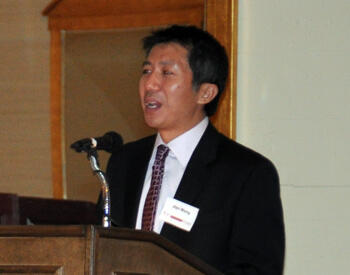Jay Wang
Jian "Jay" Wang studies international corporate communication and public diplomacy and teaches public relations at USC Annenberg's School of Journalism. He previously taught at Purdue University and the Chinese University of Hong Kong. He has published extensively on corporate social responsibility practices in emerging economies, Chinese corporate communication, health care branding, and corporate public diplomacy initiatives. He wrote Foreign Advertising in China: Becoming Global, Becoming Local and co-authored China's Window on the World: TV News, Social Knowledge and International Spectacles. He is a member of the USC U.S.-China Institute executive committee.
This video is also available on the USCI YouTube Channel.
Click on the play button above for Jay Wang's presentation on the Beijing Olympics.
There’s no doubt that the 2008 Beijing Games affected international perceptions of China. The image projected and responses to it were also the subject of satire, as can be seen in this South Park clip:
prelude and exposition (Beijing wins the games and begins preparations)
Click here to return to the USC Beijing Olympics conference page.




